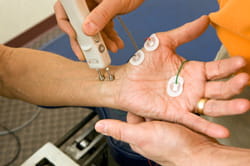 If your doctor has recommended an electromyography (EMG) and nerve conduction velocity (NCV; also known as a nerve conduction study or NCS) test at Denver Health, here is what you can expect during your appointment.
If your doctor has recommended an electromyography (EMG) and nerve conduction velocity (NCV; also known as a nerve conduction study or NCS) test at Denver Health, here is what you can expect during your appointment.
Electromyography and Nerve Conduction Testing
EMG/NCV is a test to determine how your muscles and nerves work and if they are functioning correctly, and if not, why. If the muscle is not working correctly, it must be decided whether there is a problem with the nerve or the muscle. EMG/NCV testing helps the doctor decide this.
Unlike x-rays and MRIs, which are static images, an EMG is one of the few tests we have to show the actual function of the nerves and muscles.
What You Can Expect
- To test the nerves, small electrodes will be applied to the skin on the arms and/or legs. During the test, you will feel electrical impulses on the skin, and your muscles may twitch.
- To test the muscles and their nerve supply, a sterile plastic coated wire electrode is inserted through the skin into selected muscles. This wire is a very thin needle, so you may feel some discomfort.
- The total time for the exam is about 1 hour.
Before the Procedure
- Please do not use lotions or creams on the day of the examination.
- Wear comfortable, loose fitting clothing (tank tops and loose shorts are the best). You may be asked to change into a medical gown as we often need to evaluate both the lower and the upper part of the limb.
- Eat and take your medications as usual.
We look forward to seeing you at our office for your appointment. If you have any questions before your visit, please contact us.


